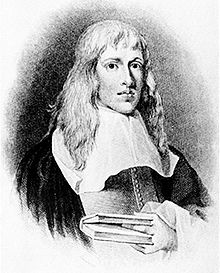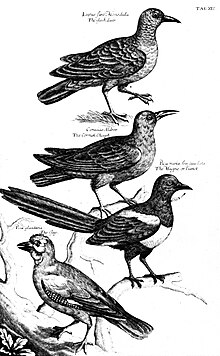Francis Willughby
Francis Willughby ['wɪləbiˑ] (also Francis Willoughby; born November 22, 1635 in Middleton Hall , Warwickshire , England, † July 3, 1672 in Wollaton Hall) was an English naturalist, especially ornithologist and ichthyologist .
life and work
Francis Willughby studied at Cambridge (1653-1659) and became a student of John Rays , with whom he went to the west coast of Wales in 1662 to watch the seabirds brood. On May 20, 1663 he became a member ("Original Fellow") of the Royal Society . In 1667 Francis Willughby married Emma Barnard, with whom he had three children. Son Francis died at the age of 19, daughter Cassandra (1670–1735) became Duchess Chandos, and son Thomas (1672–1730) was made a peer by Queen Anne (1st Baron Middleton).
From 1663 to 1666 Willughby had traveled with Ray to the Netherlands, Germany, Switzerland and Italy, and Willughby alone had toured Spain. On their return they were now planning to publish their research, but Willughby, of weak constitution, soon died of pleurisy. Ray published Willughby's Ornithologiae libri III 1676 (English: 1678), the beginning of scientific ornithology - for example, it showed that the swallows, contrary to Aristotle's opinion, were migratory birds. Willughby's De historia piscium libri IV followed in 1686 and his History of 1710 Insects (edited by William Derham ).
Francis Willughby was the first - in contrast to Conrad Gessner - to expressly ban all contemplative, moral and supernatural (such as alchemistic) considerations from his natural history (biological) texts as unscientific. In the attempt to come closer to the natural relationship in the arrangement of the species and genera, Willughby and Ray have taken a very large step forward. Incidentally, Willughby also wrote a book about the games of his time from the standpoint of the mathematician, which was re-edited in 2003 .
At the Willughby family seat, Wollaton Hall (now owned by the City of Nottingham ), the Willughby and Ray collections are accessible (mostly stuffing preparations from birds and mammals; a large herbarium was also brought back from the European trip ). Willughby's manuscripts are in the Middleton Collection at the University of Nottingham Library.
The following are named after Willughby: a leaf cutter bee ( Megachile willughbiella Kirby 1802) and the plant genera Willughbeia Scop. and Willughbeiopsis Rauschert from the dog poison family (Apocynaceae).
Fonts (selection)
Web links
- Entry to Willughby; Francis (1635-1672); Naturalist in the Archives of the Royal Society , London
Individual evidence
- ↑ But the whales, for example, remained fish in spite of their vertical tail fin movement: pisces pulmonati , "lung fish", so to speak; For Ray and Willughby, it is crucial that fish have fins, not legs (like seals).
- ↑ David Cram, Jeffrey Forgeng, and Dorothy Johnston: The Book of Games of Francis Willughby (1635–1672). A Seventeenth-Century Treatise on Sports, Games and Pastimes (Aldershot, 2003)
- ↑ Lotte Burkhardt: Directory of eponymous plant names - Extended Edition. Part I and II. Botanic Garden and Botanical Museum Berlin , Freie Universität Berlin , Berlin 2018, ISBN 978-3-946292-26-5 doi: 10.3372 / epolist2018 .
| personal data | |
|---|---|
| SURNAME | Willughby, Francis |
| ALTERNATIVE NAMES | Willoughby, Francis |
| BRIEF DESCRIPTION | English naturalist, ornitho and ichthyologist |
| DATE OF BIRTH | November 22, 1635 |
| PLACE OF BIRTH | Warwickshire , England |
| DATE OF DEATH | July 3, 1672 |
| Place of death | Wollaton Hall |

